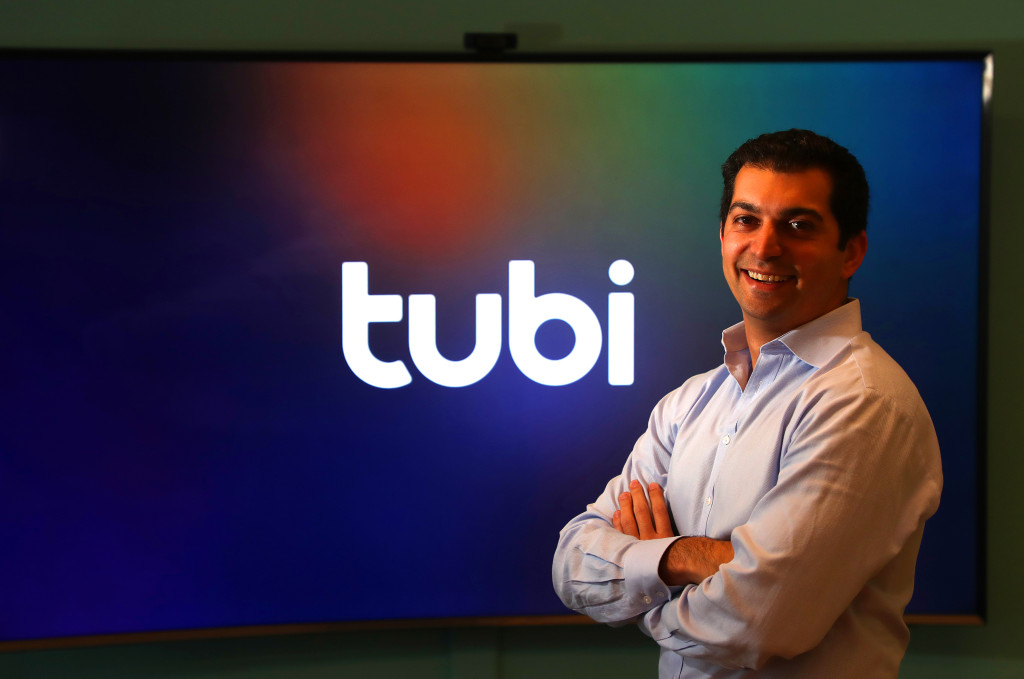With the growth of internet-based streaming television, it’s possible to go to Apple TV, Roku or really any set-top box and find almost anything you might want to watch.
For example, right now you can stream titles like the psychological thriller “Memento,” the Coen Brothers remake of the John Wayne classic “True Grit,” the Oscar-winning animated comedy “Rango” or, relive one of the biggest business con jobs of all time with the documentary “Enron: The Smartest Guys in the Room.”
But if you’re expecting to find these films on Netflix, think again. Despite the streaming giant’s vast content library, none of the aforementioned movies is currently available on the platform — and there is no guarantee they will ever appear among its offerings.
Those titles can be found on Tubi, a San Francisco-based streaming TV service that has done away with the subscriber model used by major streaming services like Netflix and Hulu. Instead of charging a a monthly fee to viewers, Tubi earns it all of its revenue through advertising, allowing it to offer the service to its customers for free.
Beyond the lack of fees, the company makes sure viewers know it has something Netflix doesn’t, grouping titles not offered by its larger competitor in a cheekily-titled category “Not On Netflix.”
“I don’t want to watch a new, original show every day,” Tubi co-founder and CEO Farhad Massoudi said during a recent interview at the company’s headquarters. “Not On Netflix is a popular category because it means we have a lot of content you can’t find elsewhere. We’re not suggesting you cancel your Netflix subscription. We’re suggesting that we solve a different problem.”
That problem, according to Massoudi, is subscription fatigue, which can strike cord-cutting consumers who despite not paying for traditional cable or satellite TV service, find themselves spending so much for streaming services that any savings they may have anticipated quickly evaporate. Beyond offering viewers the chance to watch movies and TV shows they can’t find with their paid Netflix subscriptions, Tubi is available at every consumer’s favorite price: free.
“The idea of an average household that subscribes to Netflix and Amazon, Hulu, HBO, the new Disney channel (Disney+), ESPN+ and YouTube Red is ridiculous,” Massoudi said. “Not that these services don’t have amazing content. But it became very clear to us that there was an opportunity to aggregate the other 99 percent of content out there for free.”
The shift to an ad-based service means taking a different approach to finding the kinds of content that viewers are interested in, and which studios and TV networks want to use to make money, Massoudi said. While Tubi has been operating for a little more than four years, the company’s roots are in the CEO’s prior company, AdRise, a technology platform that ran video on-demand services for apps such as the Starz premium TV network. “We learned a ton about video ecosystems, what works, and what doesn’t work,” he said.
What works for Tubi, he said, is using data from what its viewers are interested in to determine the types of content it chooses to license, and how much it is willing to pay for that content. The company now has a library of more than 12,000 movies and TV shows — more than double the approximately 5,000 titles in Netflix’s content stable.
“We saw an opportunity to build a truly data driven media company that relies on machine learning for a lot of aspects of its business, from user recommendation to acquisition,” Massoudi said. “And that’s why we stopped doing what we were doing (with AdRise) and doubled down on Tubi, and it took off.”
As a privately held company, Tubi doesn’t disclose sales figures or viewer numbers. According to Massoudi, the company’s viewership is rising — and as the number of viewers and viewing hours on the platform climb, he said, the company is able to increase the rates it charges for advertising.
“The rates are determined by the market,” Massoudi said. “In our world, our viewership is growing at a rapid pace. The more and more people are learning about Tubi and discover more content on Tubi, that ends up driving a lot of our revenue growth.”
Of course, Tubi isn’t alone in the free, ad-supported video-streaming market — Sony’s Crackle, Viacom’s Pluto TV and Roku’s own Roku Channel all stream thousands of titles for no charge. Industry analysts say the fact that so many TV streamers are offering ad-supported services that customers don’t have to pay for underscores the rapidly changing nature of television consumption.
“The whole category is growing and benefiting from the shift of consumers from linear TV to streaming,” said Rich Greenfield of media and technology research firm BTIG. “It’s still very nascent, but we have a bunch of these companies trying to build ad-supported businesses. And people do love the idea of TV for free.”
These services are up against subscriber-based behemoths that continue to dominate TV streaming: Netflix, which charges $12.99 a month for its standard plan and reported earlier this year that it now has 149 million paid memberships worldwide. Hulu, whose monthly subscription plans start at $5.99 and go as high as $50.99, reported this month that it now has 28 million subscribers in the United States, its only market.
Unlike it’s larger streaming rivals, which have invested heavily in original programming in recent years, Tubi has no plans to invest money or time into making its own content. “We don’t believe in that strategy,” Massoud said. “We think it’s a really bad idea and that it distracts from the value proposition.”
Seth Shafer, an analyst with S&P Global Intelligence, agreed that there is a great deal of demand for the programming offered ad-based streaming providers like Tubi. But, Shafer said, such companies could face a shortage of programming as studios and networks reel in the amount of content they choose to license to other streaming services.
“Their model makes sense, since they aren’t doing original content,” Shafer said. “But there is a challenge with how much they pay and how much is available for licensing. In a way, they are at the mercy of the content providers.”
For example, Disney is expected to migrate at least some of its massive catalogue — as well as those of Disney-owned studios like Pixar, Marvel, and Lucasfilm —to Disney+, its own streaming service, which is expected to launch on Nov. 12. (Hulu is also now fully owned by Disney.)
But if Massoudi is worried about Tubi’s content pipeline shrinking, he doesn’t show it. He’s confident that viewers will continue to want a service at every customer’s favorite price: free.
“I’m actually proud that we didn’t take the normal approach,” he said. “What we have is made available at no additional cost or commitment. And we don’t have to justify ourselves on your bill at the end of the month.”










